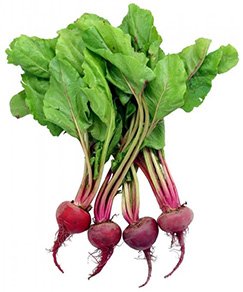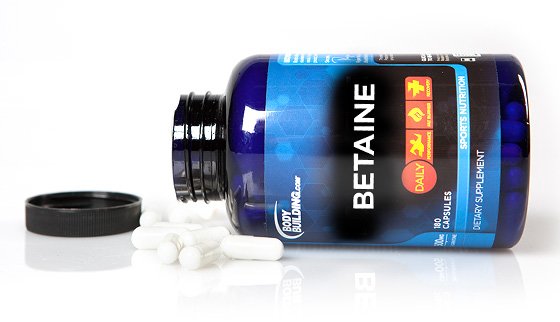Every once in a while, a hot new supplement comes along and generates a buzz based on a single study that sounds—and often is—too good to be true. And then there are the supplements that gradually build up a solid body of research without much hype. Then, years later, they finally get the recognition they deserve. Betaine is one of these.
In recent years, betaine has become a common ingredient in new pre-workout and post-workout products. But it's actually not a new supplement. People have been taking it for health reasons for many years. Only now, researchers are showing how powerful of an ally it can be for athletic performance and body composition.
If you like to be ahead of the curve, then it's time you get behind the label of your favorite pre-workout and see what this promising supplement can do for you.
Stoppani Expert Guide Betaine
Watch The Video - 09:21
What is betaine?
Betaine (pronounced "BEET-uh-een") is also sometimes sold under its technical name of trimethylglycine, or as TMG, for short. The names are pretty much interchangeable; no matter what you call it, it's made of the amino acid glycine with three methyl groups attached to it.

In the human body, betaine is naturally derived from the breakdown of choline, and it's also found in a number of food sources. One of these, you probably guessed, is beets.
Betaine got its name because it was originally isolated from sugar beets, known by their Latin name of Beta vulgaris. But ironically, a number of other foods are far richer sources. For example, 3 oz. of wheat germ contains more than 1,000 mg, which is more than four times the betaine in the same amount of beets. Spinach and quinoa both provide more than twice the amount of betaine as beets. But the name has still stuck.
In all of these plants, betaine serves the same crucial function: protecting the cells from stress, like what happens during droughts or extreme temperatures. It has also been used as a supplement in animal feeds for decades, in order to make pigs, chickens, and salmon healthier and more resilient.
In human health circles, betaine has also been revered for its health promoting effects. People have taken it to support joint and liver health and promote healthy inflammation levels.* In some studies, betaine was even been found to support healthy cholesterol levels, already in normal range.*
What does it do?
In humans, most of betaine's purported benefits derive from its role as a methyl donor. A methyl donor is any molecule that can transfer a methyl group, which is a carbon atom attached to three hydrogen atoms, to another molecule. Many important biochemical processes in the body rely on methylation.
The most critical reaction where betaine performs this function is in the methylation of the amino acid homocysteine to form methionine. Methionine is important in the body's internal synthesis of creatine. So one way that betaine may boost muscle strength and size is by increasing creatine production in the body.*
Methionine also plays an important role in muscle protein synthesis, and specifically the process known as "translation." By having more methionine available for this process, protein synthesis is ramped up, and therefore so is the potential for muscle growth and strength gains.
Betaine may also has the beneficial effect of supporting healthy homocysteine levels.* High homocysteine levels have been shown to impair insulin signaling, which can interfere with muscle growth and fat loss.
And finally, betaine supplementation has also been suggested to raise levels of S-adenosylmethionine, also known as SAMe. Having healthy levels of SAMe may support positive mood, promote liver health, and aid joint recovery.*

What are the Performance and Physique Applications?
In the last few years, clinical studies have looked at betaine supplementation in a number of modalities, from strength, to muscle growth, to endurance and sprinting performance. What do they all have in common? Betaine left the placebo in the dust.
One of the first studies to look into betaine's performance-supporting effects was done in my old lab at the University of Connecticut in 2010. The UCONN researchers found that weight-trained athletes taking 1.25 grams of betaine twice per day increased their muscle strength by 25 percent, and their muscle power by 20 percent.* They also determined that betaine significantly increased markers for muscle protein synthesis following a workout as compared to the placebo.*
Since this initial study, other researchers have found that betaine supplementation helped lifters complete more total reps in bench press workouts, pedal with more power in cycling workouts, and sprint for almost 40 seconds longer than subjects drinking just water. Like the similar-sounding beta-alanine, it has also been suggested to significantly lower levels of lactate, which can delay muscular fatigue and allow athletes to train harder, for longer.*

And then there's the latest study on betaine, which comes from the College of Springfield in Massachusetts. Weight-trained males followed an undulating periodized weight-training program for six weeks. One group supplemented with 1.25 grams of betaine twice per day and one group supplemented with a placebo twice per day. They reported that the subjects supplementing with betaine increased muscle mass by 4 pounds and arm size by 10 percent, all while decreasing body fat by 7 pounds.* The placebo group experienced no increase in muscle mass or arm size and no loss of body fat.
What's to explain these incredible results? A recent study from UCONN indicated that these increases in muscle strength, power, and endurance may be due to betaine's ability to increase levels of important anabolic substances while supporting a healthy balance of the catabolic hormone cortisol.*
Previous research also suggests that betaine supplementation increases nitric oxide and helps regulate cellular fluid volume, which could further promote muscle pump and overall muscle size.*
Are there any side effects?
There are no known serious side effects of betaine supplementation. However, it can cause nausea, upset stomach, and/or diarrhea in some people. This is one good reason to split your intake into two smaller daily doses, as several of the recent studies have done.

How should I stack it?
It's no coincidence that betaine is in pre-workout supplement blends alongside ingredients like creatine, L-citrulline, and beta-alanine. Its effects are definitely complementary to these tried-and-true performance supports, and it indirectly helps your body produce and process creatine to boot.*
Several of the most promising recent studies focusing on betaine have included it as a pre-workout, either on its own in water or mixed into a drink with elecrolytes and carbs. Then, the subjects took a second dose later in the day.
That seems like a solid approach to me. Either add betaine to your current pre- and post-workout stack, or look for a blend that includes it.
Should I cycle it?
At this time, there doesn't appear to be any reason to cycle betaine. It can be taken continuously.
When should I take it?
It is estimated that most people consume about 1-2 grams of betaine in their daily diet. However, research does confirm that supplementing with extra betaine provides distinct health and performance benefits. Plus, research confirms that a good deal of betaine is lost in the sweat during exercise. This further supports the notion that you should supplement with betaine daily, and not only before working out.
Given that betaine has been suggested to boost greater levels of muscle protein synthesis and can decrease cortisol levels, it makes sense to put those doses on both ends of your intense training. This is when you work hardest to create an anabolic environment.
So look for products which supply betaine in the form of betaine monohydrate, betaine anhydrous, or simply listed as trimethylglycine (TMG). Take 1.25-1.5 grams of betaine twice per day, preferably pre- and post-workout.

What's the Bottom Line?
The bottom line is that betaine can help to take your strength gains and lean mass gains to new levels. It may not have the name-recognition of a classic supplement like creatine yet, but its star is definitely is on the rise.
It appears to be safe and effective, is easily stacked with other supplements, and has the potential to support your general health and well-being outside of the gym to boot.*
For a stack that can't be beat, don't forget to include betaine.
These statements have not been evaluated by the Food and Drug Administration. This product is not intended to diagnose, treat, cure, or prevent any disease.
References
- Craig SA. Betaine in human nutrition. Am J Clin Nutr. 2004 Sep;80(3):539-49.
- Atkinson W, et al. Dietary and supplementary betaine: acute effects on plasma betaine and homocysteine concentrations under standard and postmethionine load conditions in healthy male subjects. Am J Clin Nutr. 2008 Mar;87(3):577-85.
- Steenge, GR, et al. Betaine supplementation lowers plasma homocysteine in healthy men and women. J Nutr. 2003 May;133(5):1291-5.
- Schwab, U., et al. Betaine supplementation decreases plasma homocysteine concentrations but does not affect body weight, body composition, or resting energy expenditure in human subjects. Am J Clin Nutr. 2002 Nov;76(5):961-7.
- Graybiel A, et al. Use of betaine and glycocyamine. Ann West Med Surg 1951;5:863-75.
- Morrison LM. Results of betaine treatment of atherosclerosis. Am J Dig Dis 1952;19:381-4.
- Barak AJ, Tuma DJ. Betaine, metabolic by-product or vital methylating agent? Life Sci. 1983 Feb 14;32(7):771-4.
- Barak AJ, et al. Betaine effects on hepatic methionine metabolism elicited by short-term ethanol feeding. Alcohol. 1996 Sep-Oct;13(5):483-6.
- Barak AJ, et al. Dietary betaine promotes generation of hepatic S-adenosylmethionine and protects the liver from ethanol-induced fatty infiltration. Alcohol Clin Exp Res. 1993 Jun;17(3):552-5.
- Junnila M, et al. Reduction of carbon tetrachloride-induced hepatotoxic effects by oral administration of betaine in male Han-Wistar rats: a morphometric histological study. Vet Pathol. 2000 May;37(3):231-8.
- Junnila M, et al. Betaine reduces hepatic lipidosis induced by carbon tetrachloride in Sprague-Dawley rats. Vet Hum Toxicol. 1998 Oct;40(5):263-6.
- Wettstein M, et al. Betaine as an osmolyte in rat liver: metabolism and cell-to-cell interactions. Hepatology. 1998 Mar;27(3):787-93.
- Zapadniuk VI, et al. Corrective effect of trimethylglycine on the nicotinamide coenzyme and adenine nucleotide content of the tissues in experimental atherosclerosis. Farmakol Toksikol. 1986 Jul-Aug;49(4):71-3.
- Panteleimonova TN, Zapadniuk VI. Effect of trimethylglycine on lipid metabolism in experimental atherosclerosis in rabbit. Farmakol Toksikol. 1983 Jul-Aug;46(4):83-5.
- Zahn A, et al. Effects of methionine and betaine supplementation on growth performance, carcass composition and metabolism. Poult Sci 2006, 47:576-580.
- Maresh, CM, et al. The effects of betaine supplementation on strength and power performance. Medicine & Science in Sports & Exercise 39(5 suppl.): S304, 2007.
- Hoffman JR, et al. Effect of betaine supplementation on power performance and fatigue. J Int Soc Sports Nutr. 2009 Feb 27;6:7.
- Lee EC, et al. Ergogenic effects of betaine supplementation on strength and power performance. J Int Soc Sports Nutr. 2010 Jul 19;7:27.
- Trepanowski JF, et al. The effects of chronic betaine supplementation on exercise performance, skeletal muscle oxygen saturation and associated biochemical parameters in resistance trained men. J Strength Cond Res. 2011 Dec;25(12):3461-71.
- Pryor JL, Craig SA, Swensen T. Effect of betaine supplementation on cycling sprint performance. J Int Soc Sports Nutr. 2012 Apr 3;9(1):12.
- Czapla, R., et al. Effect of betaine on cycling sprint power. J Int Soc Sports Nutr. 2010 Apr;7(Suppl 1):P23.
- Armstrong LE, et al. Influence of betaine consumption on strenuous running and sprinting in a hot environment. J Strength Cond Res. 2008 May;22(3):851-60.
- Apicella JM, et al. Betaine supplementation enhances anabolic endocrine and Akt signaling in response to acute bouts of exercise. Eur J Appl Physiol. 2013 Mar;113(3):793-802.
- Kraemer, W.J., et al. The influence of betaine supplementation on work performance and endocrine function in men. Annual Meeting of the National Strength and Conditoning Association, 2010.
- Cholewa, J. M., et al. Effects of betaine on body composition, performance, and homocysteine thiolactone. J Int Soc Sports Nutr. 2013 Aug;10:39.
- Iqbal, O. Betaine induced release of tissue factor pathway inhibitor and nitric oxide: Implications in the management of cardiovascular disease. FASEB 2006 Mar; J 20: A655.
- Lever M, Slow S. The clinical significance of betaine, an osmolyte with a key role in methyl group metabolism. Clin Biochem. 2010 Jun;43(9):732-44.
- Craig, S. S., et al. The betaine content of sweat from adolescent females. J Int Soc Sports Nutr. 2010 Jan;7:3.
